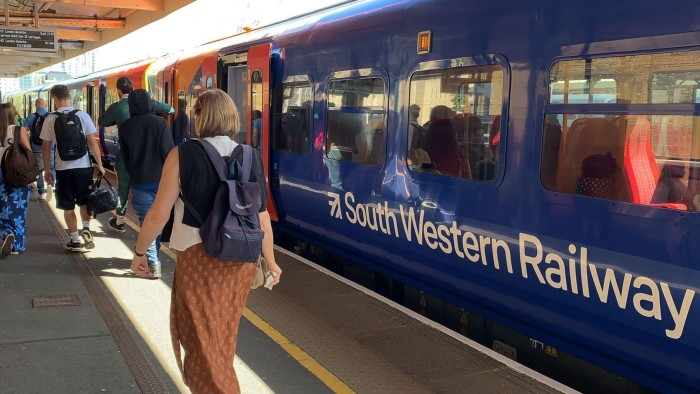Unlock the Editor’s Digest for free
Roula Khalaf, Editor of the FT, selects her favourite stories in this weekly newsletter.
A row over a £1bn train fleet has broken out between the government and private transport operator First Group, threatening to overshadow the first nationalisation of a train operator under the Labour government.
South Western Railway, one of the UK’s busiest rail operators, was taken into state control on Sunday. But only around five of its flagship new trains will be available to run, following years of delay in their rollout.
First Group held the contract to operate the SWR franchise from 2017 until this weekend alongside Hong Kong’s MTR Group, which had a minority stake. SWR carries more than 150mn passengers a year.
Transport secretary Heidi Alexander said this week that Labour’s plan to nationalise all train operators by the end of this parliament will “wave goodbye to 30 years of inefficiency, waste and passenger frustration” following the industry’s privatisation in the 1990s.
In a sign of the tensions between the government and some owning groups, Alexander said she had inherited “an abject mess from the private operator”, speaking at a depot in Bournemouth.
Only five of a fleet of 90 new “Arterio” trains are available, following delays in building the trains and a row with unions over their safe introduction, including whether drivers or guards should operate the doors.
The trains, built by Alstom in Derby, were meant to enter service by 2019. Department for Transport officials have written to First Group to accuse it of not informing them about January negotiations with unions regarding the trains.
The operator subsequently agreed a compromise deal with unions which will see the drivers open the doors, and guards close them.
First Group executives believe this will allow the trains to enter service more quickly, but there are frustrations within government over how the company has struggled with its industrial relations.
The executives maintain the DfT was kept informed throughout, including signing off on all its major decisions. They do not believe there have been any contractual breaches. First Group declined to comment.
One rail boss said the continued delays over the introduction of the fleet meant SWR faced a “potentially messy” first year, and there are concerns this could undermine the start of the wider nationalisation project, which is popular with the public.
Four train operators were nationalised by the previous government because of performance or financial problems, and London commuter lines C2C and Greater Anglia will follow later this year.
Staff, rolling stock leases and other assets must be transferred overnight, while the railway continues running.
The train companies will be combined with the operations of Network Rail, the state-owned operator of the UK’s railway infrastructure, on a regional basis to create “alliances”.
These will be overseen by a new public body, Great British Railways, which will unite track and train for the first time since British Rail disappeared, but not launch until 2027.
Standing by a train branded with the new GBR logo, Alexander said nationalisation is not a silver bullet given the problems facing the industry.
Passenger numbers collapsed to as low as 5 per cent of normal levels in 2020 when Covid struck, but recovered to exceed pre-pandemic levels for the first time at the end of last year, according to Financial Times analysis of industry data.
But revenue is still around 20 per cent below pre-pandemic levels, as a result of fewer commuters.
Train cancellations have meanwhile ballooned to their highest level on record, in large part because of driver shortages.
Alexander said the new structure would improve performance, and that the state-owned railway would prioritise recruiting more drivers and reduce the reliance on voluntary overtime.
Government officials also believe that nationalisation can significantly cut costs, including the £150mn a year paid to private companies to run trains.
Further savings can be made by reducing duplication in an industry which has fragmented since privatisation, such as combining back-office functions of the various train companies as they come into public ownership.
But there is concern within the industry that the government will not give GBR autonomy to run the railway without political interference.
“There needs to be less micromanagement from within the DFT, but it’s not clear they are willing to let go,” one person said.
Richard Bowker, former head of the Strategic Rail Authority who presents the Green Signals podcast, said bringing together track and train is a “pragmatic and sensible thing to do”.
“But the key is not who owns it,” he said. “It is: are the people who are running it day to day going to be genuinely empowered to make the right decisions to run the railway?”
Asked whether she would commit to not interfering in the running of GBR, Alexander said: “I do not want to be the Fat Controller,” a reference to the fictional character in the Thomas & Friends television series. “I want experts to be running the railway.”





